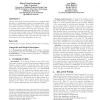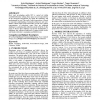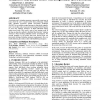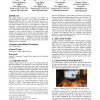ASSETS
2015
ACM
8 years 7 months ago
2015
ACM
Playing error-based exercises presented in a computer game was found to significantly improve the spelling skills of chil dren with dyslexia in Spanish. Since there are no simi...
ASSETS
2015
ACM
2015
ACM
Faster Text-to-Speeches: Enhancing Blind People's Information Scanning with Faster Concurrent Speech
8 years 7 months ago
Blind people rely mostly on the auditory feedback of screen readers to consume digital information. Still, how fast can information be processed remains a major problem. The use o...
ASSETS
2015
ACM
8 years 7 months ago
2015
ACM
Recent contributions proposed sonification techniques to al low people with visual impairment or blindness to extract information from images on touchscreen devices. In this co...
ASSETS
2015
ACM
8 years 7 months ago
2015
ACM
Most work investigating mobile HCI is carried out within controlled laboratory settings; these spaces are not representative of the real-world environments for which the technolog...
ASSETS
2015
ACM
8 years 7 months ago
2015
ACM
Assessing a user’s situation awareness can provide a great way to learn about the user’s mental model when performing related tasks. Situation Awareness Global Assessment Tech...
ASSETS
2015
ACM
8 years 7 months ago
2015
ACM
Transcription makes speech accessible to deaf and hard of hearing people. This conversion of speech to text is still done manually by humans, despite high cost, because the qualit...
ASSETS
2015
ACM
8 years 7 months ago
2015
ACM
Poor spelling is a challenge faced by people with dyslexia throughout their lives. Spellcheckers are therefore a cru cial tool for people with dyslexia, but current spellchecker...
ASSETS
2015
ACM
8 years 7 months ago
2015
ACM
Detecting dyslexia is crucial so that people who have dyslexia can receive training to avoid associated high rates of aca demic failure. In this paper we present Dytective, a ga...
ASSETS
2015
ACM
8 years 7 months ago
2015
ACM
This paper describes a study examining the usability of OnScreenDualScribe (OSDS), a tool to support individuals with physical disabilities with text entry and cursor movement. A ...
ASSETS
2015
ACM
8 years 7 months ago
2015
ACM
Technology workers are often stereotyped as being socially awkward or having difficulty communicating, often with humorous intent; however, for many technology workers with atypic...




